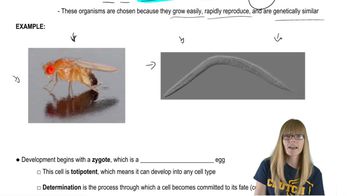Here are the essential concepts you must grasp in order to answer the question correctly.
Maternal-Effect Genes
Maternal-effect genes are genes expressed in the mother that produce mRNA or proteins, which are then deposited into the oocyte (egg) during oogenesis. These maternal products influence the early development of the embryo, affecting processes such as cell division, axis formation, and the establishment of body plans.
Recommended video:
Embryonic Development
Embryonic development refers to the series of stages that an embryo undergoes from fertilization to the formation of a fully developed organism. Maternal-effect genes play a crucial role in this process by regulating the initial cellular environment and signaling pathways that guide the embryo's growth and differentiation.
Recommended video:
Gene Regulation
Gene regulation involves the mechanisms that control the expression of genes, determining when and how much of a gene product is made. In the context of maternal-effect genes, the regulation of these genes is vital for ensuring that the right proteins and RNAs are available at the correct stages of development, influencing the overall developmental trajectory of the embryo.
Recommended video:






